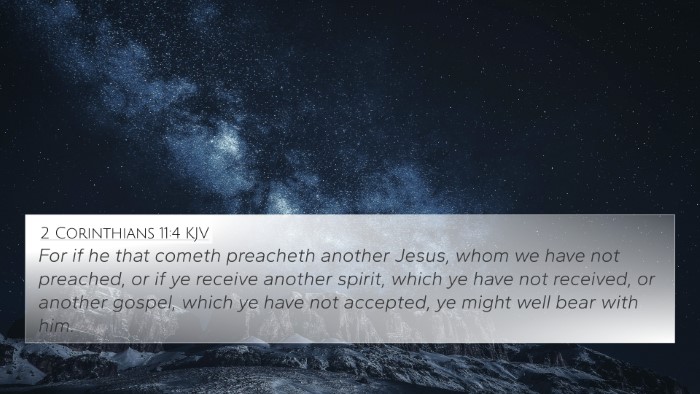Old Testament
Genesis Exodus Leviticus Numbers Deuteronomy Joshua Judges Ruth 1 Samuel 2 Samuel 1 Kings 2 Kings 1 Chronicles 2 Chronicles Ezra Nehemiah Esther Job Psalms Proverbs Ecclesiastes Song of Solomon Isaiah Jeremiah Lamentations Ezekiel Daniel Hosea Joel Amos Obadiah Jonah Micah Nahum Habakkuk Zephaniah Haggai Zechariah MalachiJob 13:2 Similar Verses
Job 13:2 Cross References
What ye know, the same do I know also: I am not inferior unto you.
Uncover the Rich Themes and Topics of This Bible Verse
Listed below are the Bible themes associated with Job 13:2. We invite you to explore each theme to gain deeper insights into the Scriptures.
Job 13:2 Cross Reference Verses
This section features a detailed cross-reference designed to enrich your understanding of the Scriptures. Below, you will find carefully selected verses that echo the themes and teachings related to Job 13:2 KJV. Click on any image to explore detailed analyses of related Bible verses and uncover deeper theological insights.

Job 12:3 (KJV) »
But I have understanding as well as you; I am not inferior to you: yea, who knoweth not such things as these?

2 Corinthians 12:11 (KJV) »
I am become a fool in glorying; ye have compelled me: for I ought to have been commended of you: for in nothing am I behind the very chiefest apostles, though I be nothing.

2 Corinthians 11:16 (KJV) »
I say again, Let no man think me a fool; if otherwise, yet as a fool receive me, that I may boast myself a little.

2 Corinthians 11:4 (KJV) »
For if he that cometh preacheth another Jesus, whom we have not preached, or if ye receive another spirit, which ye have not received, or another gospel, which ye have not accepted, ye might well bear with him.

1 Corinthians 8:1 (KJV) »
Now as touching things offered unto idols, we know that we all have knowledge. Knowledge puffeth up, but charity edifieth.

Job 37:2 (KJV) »
Hear attentively the noise of his voice, and the sound that goeth out of his mouth.

Job 42:7 (KJV) »
And it was so, that after the LORD had spoken these words unto Job, the LORD said to Eliphaz the Temanite, My wrath is kindled against thee, and against thy two friends: for ye have not spoken of me the thing that is right, as my servant Job hath.

Job 35:16 (KJV) »
Therefore doth Job open his mouth in vain; he multiplieth words without knowledge.
Job 13:2 Verse Analysis and Similar Verses
Meaning and Interpretation of Job 13:2
Job 13:2 states, "What you know, I also know; I am not inferior to you." This verse embodies the profound dialogue between Job and his friends as they engage in a discourse about suffering, knowledge, and the nature of God.
Contextual Analysis
In the book of Job, Job's friends come to comfort him during a time of immense suffering. They attempt to explain his misfortunes through the lens of traditional belief that suffering is a direct result of sin. Job, however, challenges this assumption, asserting his understanding and righteousness.
Job's assertion in this verse reflects his confidence in his knowledge of God and his situation. It signifies a moment of defiance where he asserts his equal standing in wisdom with his friends, suggesting that he possesses similar understanding of spiritual truths.
Commentary Insights
- Matthew Henry: Emphasizes the need for humility and the danger of presumption. Job states that he is aware of the truths that his friends convey, indicating that knowledge does not always equate to a right standing before God.
- Albert Barnes: Focuses on Job's assertion of equality. He believes this shows Job's inner strength and conviction, asserting that he is not without insight into the divine things they discuss.
- Adam Clarke: Notes that Job’s firm stance arises from the realization that their arguments are flawed and do not encapsulate the fullness of God’s character or purposes.
Biblical Cross-References
Job 13:2 connects with various other Bible verses, shedding light on the themes of knowledge, suffering, and divine justice. Here are notable cross-references:
- Proverbs 3:5-6: Trust in the Lord with all your heart and lean not on your own understanding.
- 1 Corinthians 8:2: If anyone thinks that he knows anything, he does not yet know as he ought to know.
- Isaiah 53:3-5: The suffering servant who bears our griefs and sorrows, highlighting the theme of unjust suffering.
- Romans 3:23: For all have sinned and fall short of the glory of God, illustrating the universality of sin.
- Job 9:2: Indeed, I know that this is true. But how can mere mortals prove their innocence before God?
- Psalms 139:1-2: O Lord, you have searched me and known me; you know my sitting down and my rising up.
- Ecclesiastes 7:20: For there is not a just man on earth who does good and does not sin.
- James 1:5: If any of you lacks wisdom, you should ask God, who gives generously to all without finding fault.
- Job 14:1: Man who is born of woman is of few days and full of trouble.
- Luke 13:4-5: The question of suffering, where Jesus asks if the Galileans were worse sinners than others because they suffered. This reflects on the nature of suffering and God's justice.
Application & Reflection
Understanding Job 13:2 offers profound insights for believers facing adversity. It invites us to acknowledge our own knowledge and experience while also encouraging humility in our understanding of God's ways. The complexity of suffering and the nature of knowledge about God encourages continual learning and seeking deeper truths.
Moreover, these cross-references allow for a richer theological and scriptural dialogue, as they interconnect through themes of wisdom, suffering, and divine insight. Studying them offers pathways for understanding not only Job's plight but our own human condition in light of God’s sovereignty.
Conclusion
Job 13:2 provides a critical lens through which to interpret the human experience of suffering and the quest for understanding. By analyzing this verse alongside its biblical connections and insights from esteemed commentaries, we foster a deeper comprehension of the relational dynamics within scripture and between humanity and God. This kind of cross-referencing enriches our study, providing a framework for exploring the intricate tapestry of biblical truths.





